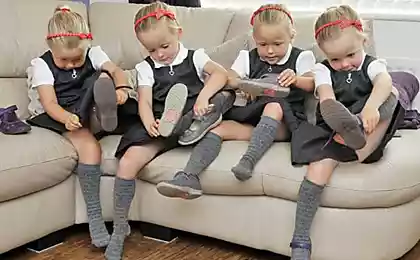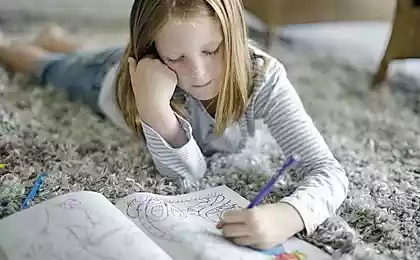173
How to help your child do homework
What could be worse for a student than to come home at night and remember that he still has a bunch of uncompleted tasks the next day? And instead of resting or other pleasant activities, you have to look for textbooks to try to figure out how to quickly cope with this.
For a child, it is easiest to ask for help from parents, to shift your problem to other people’s shoulders. As a result, the daily “adult” problems and household worries of parents are also added to the headache in the form of homework.
As a result, parents either do everything themselves, or offer the child to understand everything independently. Eventually. The child is not doing homework. or makes it bad. Therefore, these options are not suitable for us, because if you spend time studying, then it should be done with the greatest benefit.

The school year has just begun, and homework has tired not only students, but also parents themselves. Therefore, the teacher-defectologist Tatiana Mirovskaya (who herself has two school children) offers a curious way to teach the child to cope with homework.

“When the youngest son says, ‘Mom, there’s a story, a big paragraph,’ on a normal calm Sunday, that sounds like a threat.” My sixth grader turns to me for help every time he is unsure of his own abilities.
Basically, the child needs help where you need to deal with a large amount of information, where you need to organize, separate the main from the secondary, understand the essence.

However, I see my task not only in solving the home, but also in teaching the child to cope with even the most difficult tasks. Therefore, both in working with students and in classes with my own children, I try different techniques for working with information: I make plans for paragraphs, draw hints with symbols, collect mental maps.
“This time I decided to try a new technique. It occurred to me to call it a “sandwich,” because that’s exactly what the paragraph has to do. The essence of the technique is that the child has to find the main idea and understand the basis: why this text was written and what purpose it pursues. This will be the basis of the sandwich, its bread.”

“What is the best thing about a sandwich? For my son, who loves hamburgers, the most delicious is the cutlet. Therefore, the cutlet, the main ingredient we call that, although secondary in the text, but complements the main idea.”
175582
The son became so carried away with collecting his hamburger that he did not even notice how he read and mastered the entire paragraph, independently isolated both the basic and secondary information and drew conclusions. And to consolidate our understanding of the technique, we even drew this sandwich together with colored pencils.

Usually. The child does not want to do homework.But thanks to the efforts of Tatiana, the story, unloved by the schoolboy, turned out to be fun and fascinating. And all because of a new approach to working with information, which for a child is more interesting than mindless reading with futile attempts to memorize word for word each paragraph.
Of course, if you turn on the imagination and approach the study with enthusiasm, even favourite It's going to spark genuine interest. Moreover, in our time there are more opportunities for study than at any time in the history of mankind. You just need not be afraid to experiment and look for those ways of learning that are best for a particular student.
For a child, it is easiest to ask for help from parents, to shift your problem to other people’s shoulders. As a result, the daily “adult” problems and household worries of parents are also added to the headache in the form of homework.
As a result, parents either do everything themselves, or offer the child to understand everything independently. Eventually. The child is not doing homework. or makes it bad. Therefore, these options are not suitable for us, because if you spend time studying, then it should be done with the greatest benefit.

The school year has just begun, and homework has tired not only students, but also parents themselves. Therefore, the teacher-defectologist Tatiana Mirovskaya (who herself has two school children) offers a curious way to teach the child to cope with homework.

“When the youngest son says, ‘Mom, there’s a story, a big paragraph,’ on a normal calm Sunday, that sounds like a threat.” My sixth grader turns to me for help every time he is unsure of his own abilities.
Basically, the child needs help where you need to deal with a large amount of information, where you need to organize, separate the main from the secondary, understand the essence.

However, I see my task not only in solving the home, but also in teaching the child to cope with even the most difficult tasks. Therefore, both in working with students and in classes with my own children, I try different techniques for working with information: I make plans for paragraphs, draw hints with symbols, collect mental maps.
“This time I decided to try a new technique. It occurred to me to call it a “sandwich,” because that’s exactly what the paragraph has to do. The essence of the technique is that the child has to find the main idea and understand the basis: why this text was written and what purpose it pursues. This will be the basis of the sandwich, its bread.”

“What is the best thing about a sandwich? For my son, who loves hamburgers, the most delicious is the cutlet. Therefore, the cutlet, the main ingredient we call that, although secondary in the text, but complements the main idea.”
175582
The son became so carried away with collecting his hamburger that he did not even notice how he read and mastered the entire paragraph, independently isolated both the basic and secondary information and drew conclusions. And to consolidate our understanding of the technique, we even drew this sandwich together with colored pencils.

Usually. The child does not want to do homework.But thanks to the efforts of Tatiana, the story, unloved by the schoolboy, turned out to be fun and fascinating. And all because of a new approach to working with information, which for a child is more interesting than mindless reading with futile attempts to memorize word for word each paragraph.
Of course, if you turn on the imagination and approach the study with enthusiasm, even favourite It's going to spark genuine interest. Moreover, in our time there are more opportunities for study than at any time in the history of mankind. You just need not be afraid to experiment and look for those ways of learning that are best for a particular student.
























